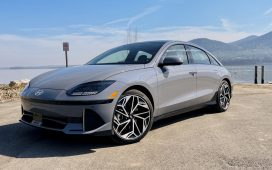Waymo and Cruise were approved to operate their robotaxi services 24/7 in San Francisco after a contentious six-hour public hearing in which residents voiced their support and opposition to the vehicles. It’s a big win for autonomous vehicle operators, who have spent tens of billions on the technology with very little return.
The California Public Utilities Commission (CPUC) voted 3-to-1 in favor of allowing the two companies to operate their vehicles at any hour of the day throughout the city of San Francisco.
“Today is the first of many steps in bringing AV transportation services to Californians,” CPUC Commissioner John Reynolds said at the end of the hearing. (Reynolds, a former general counsel at GM-backed Cruise, had recused himself from previous votes, but said “the passage of time” allowed him to vote on today’s resolution.)
“Today is the first of many steps in bringing AV transportation services to Californians”
The commissioners urged the companies to address problems raised by San Francisco officials and residents about AVs blocking roads, causing traffic jams, and impeding emergency vehicles. If there are further reports of incidents, the CPUC could vote to limit the number of vehicles allowed on the road or revoke the companies’ permits altogether, Commissioner Darcie Houck said.
“A broad range of opinions have been presented to us by the public regarding the resolutions before us today,” Houck added. “I do not take this decision lightly.”
Currently, the companies only offer limited service. The vote in favor of the companies essentially gives robotaxis full access to the peninsula and its residents. They are now able to operate similarly to Uber or Lyft — travel anywhere in the city, at any time of day, and charge money for the rides.
Waymo celebrated the decision as “a major moment” in the history of autonomous vehicles. “Today’s permit marks the true beginning of our commercial operations in San Francisco,” said Tekedra Mawakana, co-CEO of Waymo, in a statement.
Cruise CEO Kyle Vogt called it “a huge milestone for the AV industry, but even more importantly a signal to the country that CA prioritizes progress over our tragic status quo.”
The six-and-a-half-hour hearing featured a variety of voices, many of them from the disabled community, speaking to the pros and cons of autonomous ride-hailing services. Residents opposed to the companies spoke of malfunctioning cars breaking down in the middle of intersections, streets already teeming with enough motor vehicles, and robot cars allowed to run roughshod throughout the city.
The six-and-a-half-hour hearing featured a variety of voices, many of them from the disabled community, speaking to the pros and cons of autonomous ride-hailing services
Supporters praised the vehicles as safer than human drivers and the potential boon for disabled riders who currently lack adequate transportation options. After hours of public testimony, those opposed to the vehicles appeared to have a slight edge over the supporters — though hundreds spoke for both sides.
A running theme was skepticism of big tech companies that don’t have the best interests of the city of San Francisco at heart. Opponents also dismissed the autonomous vehicles as tools of the surveillance state, festooned with cameras and other sensors that could be handed over to law enforcement upon request.
San Francisco is being “pimped out” by big technology companies, a resident named Michael Martinez said during the hearing. He accused Waymo and Cruise of “trotting out blind people and their dogs” to generate sympathy for their cause. “You guys aren’t stupid,” he told the four commission members. “Don’t be stupid.”
A running theme was skepticism of big tech companies that don’t have the best interests of the city of San Francisco at heart
But the disabled community wasn’t unified in favor of the expansion. Rebecca Miller, who had visual impairment, urged the commission to vote no, citing concerns about pedestrians and a need for more affordable transportation like transit.
Others decried the loss of jobs represented by robot cars. Truckers, union members, and ride-share drivers expressed anxiety about being replaced by a computer. “A car needs to have a driver in it,” a woman who drives for Lyft said. “It’s insane not to have a driver in it.”
For months, San Francisco city officials have been pleading with the state to delay the vote, citing a spate of incidents in which autonomous vehicles have stopped traffic, blocked buses, or obstructed emergency vehicles. The city’s transit agency and fire and police department have all logged complaints with the CPUC, calling for the commission to reconsider the plan for 24/7 service.
But the CPUC said that Waymo and Cruise have met all their obligations laid out in the state’s regulatory framework covering autonomous vehicle testing and commercial operation.
“We must base our decision on this data and evidence and on the proper scope of our authority,” Alice Busching Reynolds, president of the commission, said. “We do expect the AV companies to engage with first responders, with law enforcement, with city officials, and we do expect actions to address concerns.”











